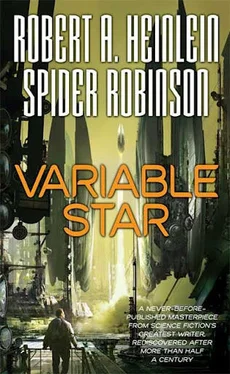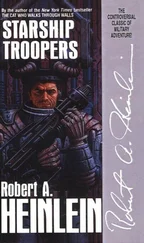“The First Officer told me to meet a Joel Johnston at the aft airlock.”
And you did. “And you did meet Joel Johnston.”
“And at the aft airlock, too,” he agreed. “That’s why I’m surprised.”
Should I ask why? No clue on his bland face. “What did you expect?”
“This is the Sheffield ,” he said. “Naturally I expected to meet a Joan Johnson at the midships lock. I only came here first so I wouldn’t confuse you by being on time. Naturally I ended up confusing us both—so symmetry is restored.” I was pretty sure that was a twinkle in his eyes. But it could have been a detaching retina. Or lunacy. “I’m pleased to meet you, Joel. I’m George R Marsden.”
We were starting to pass other people in the corridor, a few at least. All of them had clothes on. All of them ignored us, busy with their own affairs, or possibly their own business. “Glad to know you, George.”
He didn’t wince or frown, exactly, but the twinkle in his eyes guttered. “I prefer George R.”
File for later. “Of course, George R. May I ask what you do?”
Again, poker-face delivery. “I am one of the ship’s six Relativists.”
I’d reached boggle point. I couldn’t stop myself from blurting, “Pisam ti u krvotok!” Well, it should have been safe enough. And his expression still did not… well, come to exist. But somehow I knew I’d poo’ed the screwch. “Let me guess, George R: you’re part Croatian.”
He nodded. “I have the honor to be descended from the family of Nikola Tesla’s mother.”
I was weary of apologizing, and even wearier of needing to. “No offense. My mother was part Croat, too. It’s usually a safe language to swear in. There can’t be enough of us left to keep a newsgroup alive.”
“I understand, and realize you did not mean the expression literally, but merely as an ejaculation of surprise.” His eyes twinkled up again. It wasn’t quite a facial expression, but it did hint which one he might have worn if he’d gone in for them. “Ironically, it is in fact literally correct. By the end of this journey, we will all end up pissing in one another’s bloodstreams: the system depends on it.”
I couldn’t help laughing.
And at last his face came alive: he laughed. It was a pretty good laugh, too, clearly the with-you rather than at-you kind. “Oh, good,” he said. “For a minute I was afraid you’d left your sense of humor in your luggage.”
“Just my dignity.”
“You’ll fit right in,” he assured me. “Don’t worry: both dignity and luggage will catch up with you again, from time to time.”
I wish to record that this time when he made a turn, I was paying attention, and turned with him as crisply and elegantly as if we’d drilled in this.
(I did not realize we had been traveling until then in a direction that would later come to be called “up,” and were now moving horizontally again, on a deck much closer to the ship’s nose than the one we’d started from.)
What I wanted to ask, of course, was, “Why is one of the six most important people aboard this tub herding newbies from the airlock to their cubic?” But it didn’t seem polite. And I couldn’t think of anything lesser I wanted to ask, just now. I mean, this guy was one of the six most impor—
“I know just what you’re thinking,” he said.
I didn’t actually hear the last word, because a door chuff ed open in the corridor behind us just then and drowned him out. But I knew what it was. I was destined to spend the next nineteen years being his straight man. “Okay, why are you, then?”
“Because this is the Sheffield .”
“Of course.” No, what is the name of the man on second base.
“What would have constituted weirdness would’ve been if they’d sent, for instance, one of your cubicmates, who actually knew where the damn place—wait, now, this looks right, something must be wrong—no, this is it. Let me catch you.” He grabbed a rung just this side of a door (hatch, Joel, think hatch) with one hand and braked himself to a halt, while letting me use his other hand to brake myself. Somehow I ended up stationary in front of the hatch, with him beside it to my right.
The hatch bore the stenciled label “RUP-0010-E.” Below that was a sign hand-painted in some ancient font, with rather good calligraphy. It read:
The 10th Circle: a band of dopes, all we who enter here.
George R released my hand. He was smiling again. “Doubtless this will be a disaster for you, since you came to it quickly. Just try to remember at all times the Prime Law of the Sheffield .”
I don’t know plays third base. “I am keen to know it, George R.”
“No refunds.”
“Ah.”
He was drifting away before I knew he had eyes to go. “Satisfaction guaranteed, or you’re screwed. Good”—and I’m pretty sure the last four syllables as he was passing out of earshot were—“bye, Joel Johnston.”
But he might have said, “bye, Joan Johnson.”
I found myself grinning after him. His sense of humor was drier than fossil bone in vacuum. And it’s hard not to like a man whose only facial expression is a gentle smile.
Ah, that wonderful moment just before you meet new bunkmates. Like the moment just after you step off a roof, and just before you open your eyes and look down to see how many floors away the ground is.
Deep breath. Best smile. I palmed the door. After George R’s buildup, I half expected it to shock me unconscious and call for the Proctors. But it accepted me as a resident rather than merely someone unknown seeking to annoy one, and opened to me.
As it slid open, a faint cloud of pale smoke emerged and intersected with my face. Tobacco. I smiled, mildly pleased. I’m not a nicotinic myself, but I’ve always enjoyed having a smoker cubicmate. It’s hard not to like that scent, especially in thick air.
It’s going to be a while before the biological sciences really get back on their feet, but safe tobacco was one of their very first new fruits after more than a century of enforced barrenness. The Prophet repressed the weed so savagely that it became a mark of defiance, then a symbol of rebellion, and finally a way to identify other members of the Cabal. Now he’s ashes, and cigarettes no longer produce them. As my father once said, the weed outlasted the Creed.
I could see the nicotinic was the only one present in the cubic at the moment, drifting near the center. It seemed an awfully small space for four people. Then contradictory clues resolved, and my perspective shifted. The room was fine. It was just that he was awfully large for a four-person cubic. Much better. I could always kill him.
I’d have to sneak up behind him with a pretty big chainsaw, though, and take him down a limb at a time. He was enormous. Between his mass and the copious white beard he looked like a Viking chieftain, or perhaps Santa Claus’s big brother. The latter impression was strengthened by the eyeglasses I could see he wore. People who do that are usually writers or visual artists of some kind: most normal people with astigmatism are willing to risk surgery with a failure rate of about one percent. At worst you need eye transplants—what’s the big deal? He wore classic jeans and a baggy blouse with elbow-length sleeves.
As he rotated lazily the front of him came into better view and I saw that he was typing on air, and a hologram glow unreadable at this angle was keeping station with his face. A writer then, I surmised. He kept rotating until he should have seen me, but didn’t, and kept typing furiously. Definitely a writer. I hoped he was a poet. If you threaten one with death, and mean it, they always stop. Then he rotated to where I could see his hologram from the back, and my heart sank. It was way too far away to read, even if it had not been backward—but even from here I could see it was properly formatted text, with consistent margins, nothing centered, and words arranged in paragraphs that began with indents. It was about as bad as it could be: he was a novelist.
Читать дальше










